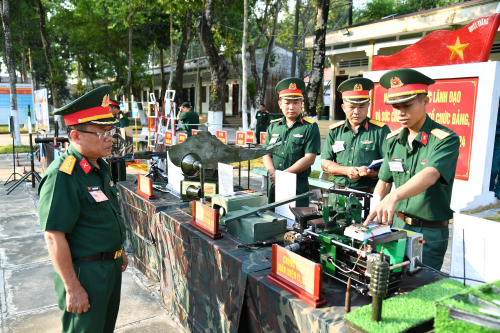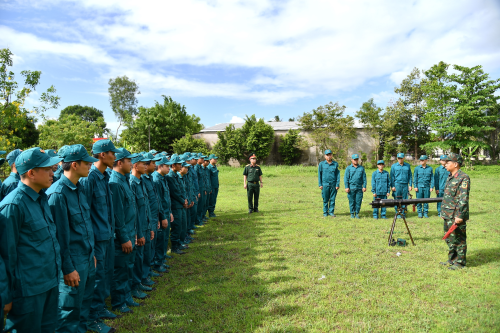Tien Giang provincial armed forces promote their core role in military - defence tasks
Located in the Southern key economic region, acting as a goods transit hub of the entire Southwestern region, the province of Tien Giang has great potential and advantages for the development of marine economy, agriculture, industry, services, and commerce, thus holding a position of importance to the region’s defence and security. Grasping and performing the two strategic tasks of Fatherland construction and protection, over the years, the province has actively unlocked resources, promoting its potential and advantages, attracting investments in socio-economic development, especially bringing into play its armed forces’ core role in military - defence work, thereby creating a favourable condition for its rapid, sustainable development. Adhering to the leadership and direction of the Provincial Party Committee and the Provincial People’s Committee, the Provincial Military Party Committee (PMPC), the Provincial Military Command (PMC), and all-level military agencies have heightened their responsibility, devoting efforts to overcome difficulties, proactively giving advice on military - defence work and directly performing this work, thus gaining many encouraging results and valuable lessons.
 |
| An initiative for training work by the Military Command of Cai Lay town |
First of all, the PMPC and the PMC have proactively given advice to the Provincial Party Committee and the Provincial People’s Committee on exercising their leadership and direction over military - defence work. Emphasis has been placed on assisting the Provincial Party Committee and the Provincial People’s Committee in issuing a lot of resolutions, directives, and documents on military - defence tasks. Sound advice has been given to well conduct propagation and education work to raise awareness and a sense of responsibility among party committees and key leaders at all levels towards yearly military - defence tasks. Targets of military call-up, defence and security education, and the building of all-people national defence and defensive zones have been specifically assigned to sectors and localities, while operating mechanisms and regulations have been completed for organisations within defensive zones. At the same time, the provincial armed forces have coordinated with local offices, sectors, and unions to give advice to the province on combining socio-economic development with defence - security consolidation, building and closely managing defence works and military zones. Moreover, the PMC and all-level military agencies have promoted their core role in directing, guiding, and inspecting the implementation process. As a result, departments, sectors, and localities have seriously grasped and realised documents on military - defence work, developing action programs and plans for this work in accordance with their functions and tasks and the particularities of each area. Due regard has been paid to effectively executing projects in support of military - defence tasks. Work relationships and mechanisms of leadership and command over military - defence tasks have been concretised in a close, uniform, synchronous way to promote the strength of the entire political system and people.
As part of military - defence work, defence and security education plays an important role in building political - spiritual potential and a firm “posture of people’s hearts and minds”. Thus, the PMC, in its capacity as the Standing Organ of the Provincial Defence and Security Education Council, has cooperated with sectors and departments in giving advice to the province and directing and guiding offices, units, and localities to closely, effectively execute the Law on Defence and Security Education. Besides, it has given advice on consolidating all-level Defence and Security Education Councils, intensifying inspection and investigation of the implementation process to opportunely settle weaknesses and allow defence and security education work to be performed seriously, uniformly from grass-roots to provincial levels. It has advised the province to decentralise this work, deploy cadres, particularly those from the 1st and 2nd groups, to attend training courses held by higher echelons, and flexibly organise such courses within the province simultaneously. In 2024, the province held 3 defence and security education courses for 23 individuals from the 2nd group, 3 courses for 200 individuals from the 3rd group, 19 courses for nearly 1,700 individuals from the 4th group, and 1 course for 100 religious dignitaries, thus fulfilling all targets of defence and security education in the 2020 - 2025 tenure.
As for pupils and students, the PMC has worked with the Department of Education and Training to advise the Provincial People’s Committee on directing high schools to arrange defence and security education subject like others; vocational schools, colleges, and universities have been required to organise this subject in a concentrated or credit-based manner with support from military agencies. On a yearly basis, all pupils and students have got pass in this subject; over 78% of them have obtained merit or distinction. Moreover, the PMC has advised the Provincial Defence and Security Education Council on collaborating with the Department of Information and Communication to direct mass media to open specialised pages and columns aimed at disseminating the Party’s defence lines and the provincial armed forces’ operations and unmasking hostile forces’ plots and artifices. In 2024, over 500 pieces of news and reports were broadcast on Tien Giang Provincial Television; nearly 1,000 reports were broadcast on Tien Giang Provincial Radio; 400 pieces of news and articles were released on different magazines and newspapers. Defence and security education has been included in communal meetings and local festivals to raise citizens’ awareness and responsibility for Fatherland protection.
 |
| The training of a militia platoon |
With many industrial zones, such as My Tho, Tan Huong, Long Giang, Soai Rap Petroleum, and Binh Dong, Tien Giang province has a lot of advantages for building solid potential and postures within its defensive zones. While giving advice on building political - spiritual potential within defensive zones, the PMC has directed its offices and units to cooperate with Public Security agencies, sectors, and departments in closely appraising all socio-economic development plans and projects as the basis for approval by the Provincial Party Committee and the Provincial People’s Committee, enabling those plans and projects to both foster economic development and serve defence - security tasks in the long term, creating material, scientific, and technical resources for the building of an increasingly strong provincial defensive zone. As a result, the province’s economic growth rate has always been at 8% per annum recently; GRDP per capita has reached 7 million VND. To build an inter-connected, solid, in-depth military posture, on the basis of Military Region 9’s defensive posture planning, the PMC has collaborated with sectors, departments, and localities to advise the province to enhance state management of national defence and make more investments in constructions within provincial and district-level defensive zones, particularly in the crucial defensive directions. Over the years, the province has mobilised resources and made investments from its budget in building military posture within defensive zones, with priority given to key defensive areas, combat bases, and rear bases, thereby initially forming an inter-connected posture between levels. It has carried out surveys, closely managed terrains of tactical value, and facilitated the development of dual-purpose projects, traffic infrastructures, communication, and information technology for defence and security.
To promote its core role in military - defence field, the PMC has focused on advising the province to build adept, compact, strong armed forces in accordance with each force’s functions and tasks. Priority has been given to building the standing force tasked with manoeuvre and combat readiness as the key factor in collaborating with other forces to effectively handle all situations and maintain political security and social order and safety. Consequently, the standing force has been consolidated under the new payroll established by the Ministry of National Defence; it has brought into play its core role in coordinating, guiding, and performing military - defence work. The reserve force has been registered, managed, and arranged properly (15% of members of this force have been party members); due attention has been paid to closely managing this force’s strength and regularly conducting inspections of this force’s mobilisation readiness. The militia and self-defence force has accounted for nearly 0.94% of the population (the rate of party members within this force has reached 32.25%); all commune-level military party cells have established their own executive boards. Commune-level military cadres have been basically trained to meet the requirements of defence - security tasks at grass-roots level. To raise the armed forces’ combat readiness, synergy, and combat power, all-level military agencies have executed sufficient training programs, intensified practice, and trained their troops to master the existing weapons and equipment. At the same time, they have given advice to local party committees and authorities on fulfilling all targets of exercises at all provincial, district, and commune levels. Those exercises have contributed to improving party committees’ leadership, authorities’ administration, and staff work by the provincial armed forces and local sectors in maintaining coordination to deal with possible situations; the system of combat and search and rescue projects and documents has been adjusted and supplemented in accordance with the particularities of each unit and locality.
In addition to those above-mentioned measures, the provincial armed forces have well performed their function as an army ready for work, actively carrying out mass mobilisation, taking part in building strong political bases, playing a vanguard role in natural disaster prevention and control and in response to erosions, droughts, and saltwater intrusions, cooperating with the public security force and the border guard force in maintaining political security and social order and safety, stepping up the movement of “paying debt of gratitude”, effectively implementing policies regarding military families. Thanks to those approaches, the provincial armed forces have asserted their core role in military - defence work, greatly contributing to successfully fulfilling the two strategic tasks within the province of Tien Giang in the new situation.
Sr. Col. PHAM VAN THANH
Member of the Provincial Party Committee Standing Board
Commander of the PMC